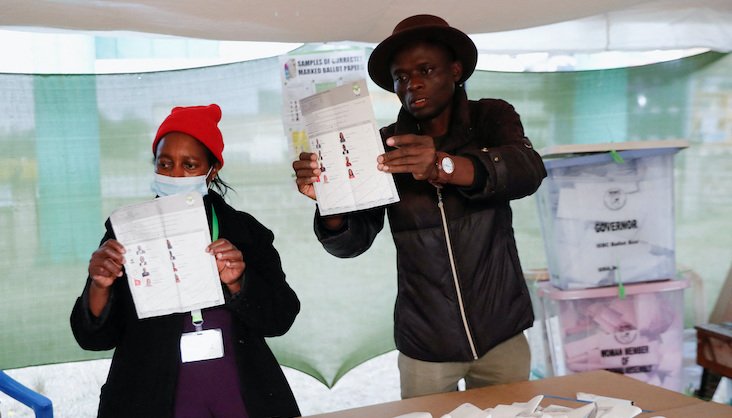[ad_1]
Voting started at 6am in many voting centres, but others opened as late as 9am, due to the late arrival of voting materials.
At Moi Primary School’s voting centre in the capital, Nairobi, voters lined up as from as early as 5am.
“I woke up early and by 5am, I was here ready to vote,” said Peter Mwangi.
“I came early but up to 6:30am voting has not started. I wanted to vote early and leave,” said Collins Ochieng, another voter.
Tanzanian former president Jakaya Kikwete, who leads the East Africa Community’s electoral observer group, witnessed the opening of the polling station.
“I’m impressed. All looks good,” he said.
Candidates vote
The presidential campaign focused on issues like the economy and corruption in government.
Ruto, 55, running for the first time, voted at 6am in his home turf of Turbo constituency in the Rift Valley.
President Uhuru Kenyatta, who fell out with deputy president Ruto, backed his former rival, Odinga.
https://www.youtube.com/watch?v=VFDIJrDct6U
Odinga, 77, seeking the presidency for the fifth time, voted at 10:30am at Old Kibera Primary School in Nairobi.
Before going to cast his vote, he told journalists: “We did our best at the campaigns and hoping for a peaceful election.”
Delay in voting in parts of Nairobi and elsewhere
There were not widespread and massive problems during the vote. Some positions may require re-runs in a few counties due to problems with voting materials.
Voting was delayed in some parts of the country after voters were turned away for going to a wrong polling station, while others could be not identified electronically through the Kenya Integrated Election Management System.
Rehema Marijani, a voter at Old Kibera Primary School, told The Africa Report that despite going early to the polling station to vote, her name was not on the voting list.
“I’m very frustrated I cannot see my name on the list,” she said.
Roots Party presidential candidate George Wajackoyah was forced to wait for more than five hours to cast his vote, after the election technology kits failed to work in the station he was voting at in western Kenya.
“I do not understand. Why is it not working? I’m very disappointed,” Wajackoyah said.
Ruto’s running mate Rigathi Gachagua also experienced the same challenge after his finger prints could not be identified. He cast his vote after the authorities found his name in the manual register.
On the other hand, Erick Okoba, who voted at Kilimani polling station, had a wonderful experience
“I’m very glad. I voted. I did not get any challenge. I pray my candidate wins.”
How did the electoral commission respond?
The deputy chairperson of the Independent Electoral and Boundaries Commission (IEBC), Juliana Cherera, admitted that there were some failures of the electronic kits in some parts of the country. The IEBC allowed the presiding and residing officers to use manual registers in those cases.
“The commission is working through its information and communications technology officers to resolve any reported issues,” she said.
The constituencies that used manual registers include Makueni, Kibwezi West constituency and Malava, Matungu, Mumias West and Mumias East constituencies.
By 4pm, the electoral body announced that more than 12 million voters, around 56% of the 22.1 million registered voters, had cast their votes.
Polls closed at 5PM in many parts of the country, with voters in queues allowed to vote.
Kenyans in diaspora also voted in 12 countries, including Tanzania, Rwanda, Uganda, Burundi, South Africa, Great Britain, Canada, the United States, Qatar, the United Arab Emirates and Germany.
Results should be announced in the next few days.
[ad_2]
Source link
